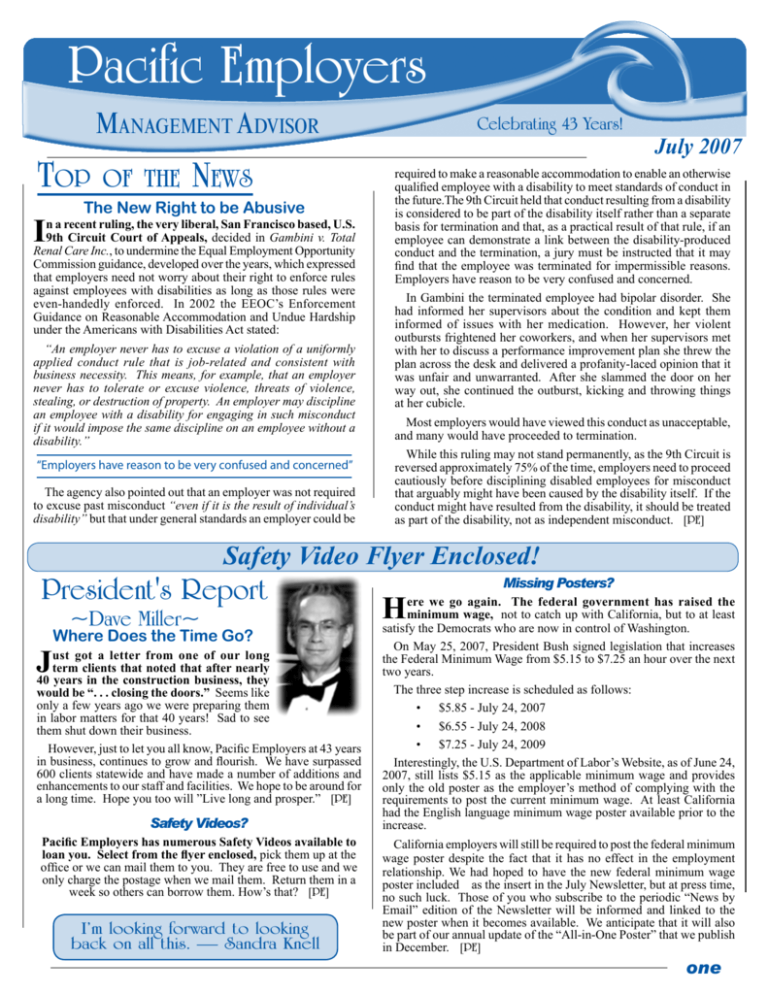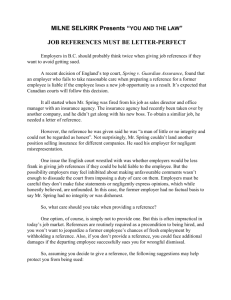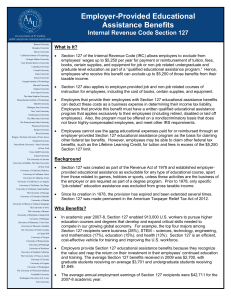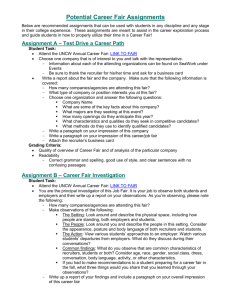PE NL July 2007
advertisement

Pacific Employers Management Advisor Top I of the News The New Right to be Abusive n a recent ruling, the very liberal, San Francisco based, U.S. 9th Circuit Court of Appeals, decided in Gambini v. Total Renal Care Inc., to undermine the Equal Employment Opportunity Commission guidance, developed over the years, which expressed that employers need not worry about their right to enforce rules against employees with disabilities as long as those rules were even-handedly enforced. In 2002 the EEOC’s Enforcement Guidance on Reasonable Accommodation and Undue Hardship under the Americans with Disabilities Act stated: “An employer never has to excuse a violation of a uniformly applied conduct rule that is job-related and consistent with business necessity. This means, for example, that an employer never has to tolerate or excuse violence, threats of violence, stealing, or destruction of property. An employer may discipline an employee with a disability for engaging in such misconduct if it would impose the same discipline on an employee without a disability.” “Employers have reason to be very confused and concerned” The agency also pointed out that an employer was not required to excuse past misconduct “even if it is the result of individual’s disability” but that under general standards an employer could be Celebrating 43 Years! July 2007 required to make a reasonable accommodation to enable an otherwise qualified employee with a disability to meet standards of conduct in the future.The 9th Circuit held that conduct resulting from a disability is considered to be part of the disability itself rather than a separate basis for termination and that, as a practical result of that rule, if an employee can demonstrate a link between the disability-produced conduct and the termination, a jury must be instructed that it may find that the employee was terminated for impermissible reasons. Employers have reason to be very confused and concerned. In Gambini the terminated employee had bipolar disorder. She had informed her supervisors about the condition and kept them informed of issues with her medication. However, her violent outbursts frightened her coworkers, and when her supervisors met with her to discuss a performance improvement plan she threw the plan across the desk and delivered a profanity-laced opinion that it was unfair and unwarranted. After she slammed the door on her way out, she continued the outburst, kicking and throwing things at her cubicle. Most employers would have viewed this conduct as unacceptable, and many would have proceeded to termination. While this ruling may not stand permanently, as the 9th Circuit is reversed approximately 75% of the time, employers need to proceed cautiously before disciplining disabled employees for misconduct that arguably might have been caused by the disability itself. If the conduct might have resulted from the disability, it should be treated as part of the disability, not as independent misconduct. [PE] Safety Video Flyer Enclosed! President's Report ~Dave Miller~ J Where Does the Time Go? ust got a letter from one of our long term clients that noted that after nearly 40 years in the construction business, they would be “. . . closing the doors.” Seems like only a few years ago we were preparing them in labor matters for that 40 years! Sad to see them shut down their business. However, just to let you all know, Pacific Employers at 43 years in business, continues to grow and flourish. We have surpassed 600 clients statewide and have made a number of additions and enhancements to our staff and facilities. We hope to be around for a long time. Hope you too will ”Live long and prosper.” [PE] Safety Videos? Pacific Employers has numerous Safety Videos available to loan you. Select from the flyer enclosed, pick them up at the office or we can mail them to you. They are free to use and we only charge the postage when we mail them. Return them in a week so others can borrow them. How’s that? [PE] I’m looking forward to looking back on all this. — Sandra Knell H Missing Posters? ere we go again. The federal government has raised the minimum wage, not to catch up with California, but to at least satisfy the Democrats who are now in control of Washington. On May 25, 2007, President Bush signed legislation that increases the Federal Minimum Wage from $5.15 to $7.25 an hour over the next two years. The three step increase is scheduled as follows: • $5.85 - July 24, 2007 • $6.55 - July 24, 2008 • $7.25 - July 24, 2009 Interestingly, the U.S. Department of Labor’s Website, as of June 24, 2007, still lists $5.15 as the applicable minimum wage and provides only the old poster as the employer’s method of complying with the requirements to post the current minimum wage. At least California had the English language minimum wage poster available prior to the increase. California employers will still be required to post the federal minimum wage poster despite the fact that it has no effect in the employment relationship. We had hoped to have the new federal minimum wage poster included as the insert in the July Newsletter, but at press time, no such luck. Those of you who subscribe to the periodic “News by Email” edition of the Newsletter will be informed and linked to the new poster when it becomes available. We anticipate that it will also be part of our annual update of the “All-in-One Poster” that we publish in December. [PE] one P a c i f i c COURT CASES T Court Goes Against Labor he US Supreme Court decided against imposing a new requirement on employer pension plans. In a unanimous decision, the justices said companies do not have a duty to consider an invitation to merge their pension plans as an alternative to terminating them. “Vantage . . . Decided To Terminate Its Pension Plans . . ” The ruling came in the case of Crown Vantage Inc., a bankrupt paper company that received a merger proposal from a labor union pension fund to cover Crown’s 17 pension plans. At the time, Vantage had already decided to terminate its pension plans and was considering using the money to buy annuities for plan participants and beneficiaries. Such a transaction would have enabled the company to recoup a $5 million surplus, which would have gone to the company’s creditors. The Bush administration supported the employer’s position that it did not have a duty to consider the invitation to merge. The union sued Crown in bankruptcy court, alleging that it breached its duties under the Employment Retirement Income Security Act by failing to perform a diligent inquiry into the proposed merger. The bankruptcy court and a federal judge ruled against the union. The action reverses the 9th U.S. Circuit Court of Appeals in San Francisco who had ruled in favor of the union. [PE] T Companionship Exemption hird party home care providers breathed a collective sigh of relief when the United States Supreme Court reversed a ruling out of the Second Circuit Court of Appeals which held that the companionship exemption from the Fair Labor Standard Act’s (FLSA) overtime requirements was not valid and binding as it related to third party providers of temporary home care services. (Long Island Care at Home v. Coke.) Under the FLSA, persons employed in domestic service employment to provide companionship care services for individuals who are unable to care for themselves are exempt from the Act’s overtime and minimum wage requirements. In the Coke case, the plaintiff sued her employer under the FLSA for minimum and overtime wages for companionship care-related services she performed in a patient’s home. A Department of Labor regulation directed that the exemption applied regardless of whether the service provider was hired E m p l o y e r s directly by the patient or was placed in the home by a third-party home care services provider. The plaintiff argued that the DOL regulation overreached its authority and was unenforceable because the DOL regulation was merely an “interpretation” and not intended to fill what the courts referred to as a “statutory gap.” The Supreme Court noted that whether or how the FLSA should apply to workers paid by a third party raises a set of complex questions and that “satisfactory answers to such questions may well turn upon the kind of thorough knowledge of the subject matter and ability to consult at length with affected parties that an agency, such as the Department of Labor, possesses.” Thus, the Court found it reasonable to infer that Congress intended its broad grant of authority to the DOL to include the authority to answer these types of questions. “Providers Breathed A Collective Sigh Of Relief . . . ” Accordingly, the Supreme Court held that the regulation was “valid and binding,” and did not exceed the DOL’s authority: “Whether to include workers paid by third parties is one of the details [of filling statutory gaps] left to the DOL to work out.” The Court further held that “where an agency rule sets forth important individual rights and duties, where the agency focuses fully and directly upon the issue, where the agency uses full notice-and-comment procedures to promulgate a rule, where the resulting rule falls within the statutory grant of authority, and where the rule itself is reasonable, then a court ordinarily assumes that Congress intended it to defer to the agency’s determination.” In the Coke case, the Second Circuit differed with other circuits that had already addressed the issue and held that the companionship exemption applied to third party providers of home care services. The case had already been reviewed by the Supreme Court once, which vacated the original Second Circuit decision and remanded the case so that the Second Circuit could consider a DOL-issued memorandum describing the application of the regulation at issue. The Second Circuit remained unconvinced on remand and again held the regulation unenforceable, which led to the second appeal to the Supreme Court. Employers’ Bottom Line: This case should put to rest the conflict between the Second Circuit and her sister circuits with regard to application of the companionship services exemption for large and small employers of temporary home care services. Employers should be cautioned, however, that such service providers’ employees must still meet the duties test to qualify for protection under the exemption. [PE] Safety Video Flyer Enclosed! two the management Human Resources Question with Candice Weaver The Month's Best Question Termination While On Leave Q: “One of our employees, who is now on leave, has had a spotty employment history with our firm. New information has come about that, had the employee been working, we would have terminated. What are our options ?” A: While an employee has the right to return to the position held before taking a family medical leave, this right is not absolute. If an employer can show a lawful reason for not restoring an employee to his or her position, such as a violation of company policy, the employer may legally terminate the employee. The reason must be unrelated to the employee’s exercise of family medical leave rights. The 2nd U.S. Circuit Court of Appeals found a termination lawful because it was the result of threats to other employees and not because of the employee’s exercise of rights under the FMLA. If an employer terminates an employee for a legitimate, non-discriminatory reason, such as a violation of company policy, it will not be in violation of the FMLA. (Sista v. CDC Ixis North America, Inc.) The court stated “A decision to the contrary would convert the FMLA into a safe harbor for any employee who makes violent threats against a coworker.” In another recent case, a California Court of Appeal determined that an employer acted properly when it terminated an employee upon her return from medical leave. The employee’s leave had extended beyond the leave provided under FMLA. The employer had filled her position with a full-time employee during the employee’s leave and had no vacant positions for which she was qualified upon her return to work. The court determined that the company’s policy was beyond what the law required and it was implemented consistently. The court found that the employee failed to provide any evidence that she was able to work when her position was filled or that she was terminated because of a disability. Further, the company had legitimate, nondiscriminatory reasons for not reinstating her - there were no positions available for which she was qualified. The company followed its policy and implemented it in a non-discriminatory manner. (Williams v. Genentech, Inc.) [PE] Want Breaking News by E-Mail? Just send a note to peinfo@pacificemployers.com Tell us you want the News by E-Mail! advisor T Employment Seminars he Small Business Development Center and Pacific Employers will host the series at the Tulare-Kings Builders Exchange on the corner of Lover’s Lane and Tulare Avenue in Visalia, CA. RSVP to Pacific Employers at 733-4256 or the SBDC, at 625-3051 or fax your confirmation to 625-3053. The mid-morning seminars include refreshments and handouts. Sexual Harassment Prevention Training C alifornia Assembly Bill 1825 (AB 1825) requires employers with 50 or more employees to provide all personnel who have “Supervisory Authority” a minimum of two hours of Sexual Harassment Prevention Training every two years. Training must include strategies for prevention and discuss remedies for victims of unlawful harassment. On Wednesday, July 18th, 7:30am registration & breakfast with program 8:00am thru 10:00am, at the Lamp Liter Inn in Visalia, the Visalia Chamber of Commerce, in cooperation with Pacific Employers, will present the state mandated Supervisors? Sexual Harassment Prevention Training Seminar & Workshop with full breakfast. Call the Chamber at 734-5876 for reservations $25 for Pacific Employers and Chamber members 2007 Topic Schedule ♦ Hiring & Maintaining “At-Will” - From the thought to hire to putting to work, we discuss maintaining procedures that protect you from the “For-Cause” Trap! Thursday, July 19th, 2007, 10am - 11:30am ♦ Record Keeping - Forms, Posters, Signs, Handouts, Fliers - Just what paperwork, posters, flyers and handouts does an Employer need? Thursday, September 20th, 2007, 10am - 11:30am ♦ Guest Speaker Seminar - Annually we bring you a speaker for a timely discussion of labor relations, HR and safety issues of interest to the employer. Thursday, October 18th, 2007, 10am - 11:30am ♦ Discipline & Termination - The steps to take before termination. Managing a progressive correction, punishment and termination program. Thursday, November 15th, 2007, 10am - 11:30am These morning seminars are free of charge and include refreshments and handouts. Dinner for 2 at the Vintage Press? That’s right! When a business that you recommend joins Pacific Employers, we treat you to an unlimited dinner for two at the Vintage Press. Phone us at 733-4256 or Toll Free 800 331-2592. three PRSRT STD U.S. Postage PAID VISALIA, CA Permit # 441 Pacific Employers Want Breaking News by E-Mail? Pacific Employers email - peinfo@pacificemployers.com Celebrating 43 Years! Safety Video Flyer Enclosed! Return Service Requested Management Advisor 306 North Willis Street Visalia , CA 93291 559 733-4256 (800) 331-2592 www.pacificemployers.com Just send a note to peinfo@pacificemployers.com Tell us you want the News by E-Mail! Articles in this Newsletter have been extracted from a variety of technical sources and are presented solely as matters of general interest to employers. They are not intended to serve as legal opinions, and should not be deemed a substitute for the advice of proper counsel in appropriate situations. Court Denies Use of Sick/Vacation Pay During FMLA Leave T he 7th U.S. Circuit Court of Appeals (covering Illinois, Indiana and Wisconsin) has held that employees on Family Medical Leave Act (FMLA) leave who are also receiving employer-provided disability benefits may not be required to use accrued sick or vacation leave during their absence. Although not specifically applicable to California employers, California courts will likely look to this decision if a California employee challenges an employer policy requiring use of sick, vacation or paid time off (PTO) during an FMLA leave or a leave of absence under the California Family Rights Act (CFRA). Repa v. Roadway Express, Inc., [PE] FREE & UNLIMITED CONSULTATION? Yes FREE! A benefit of Pacific Employers’ Membership is Free, Unlimited, direct, phone consultation on labor, safety or personnel question on the Pacific Employers’ Helpline at: (559) 733-4256 or Toll Free (800) 331-2592. Operator of Fated Train Talking on Cell W ashington Post says the operator of a Metro train that crashed into two workers last year was talking on a cell phone at the time of the fatal incident. four The newspaper said federal investigators have not yet concluded whether talking on the phone was the cause of the accident. Talking on the phone while operating trains and performing other duties is prohibited by Metro policy. The head of Security of the American Public Transportation Association, noted concern over the issue of operators talking on the job, however there is no federal standard regulating such behavior. [PE] Fired Over Headscarf jury in Phoenix has awarded $287,640—including $250,000 in punitive damages—in a religious discrimination suit against Alamo Car Rental brought by the U.S. Equal Employment Opportunity Commission (EEOC) who charged Alamo with post-9/11 backlash discrimination on the basis of religion when it fired a Somali customer sales representative in December 2001 for refusing to remove her head scarf during the Muslim holy month of Ramadan. According to the lawsuit, Alamo refused to permit an employee to continue to cover her head, as she had done in past years during Ramadan, even if she wore an approved Alamo-logo scarf. What’s more, there was evidence that wearing a head scarf didn’t violate the company’s dress policy. The company unsuccessfully argued that it was under no obligation to accommodate the employee because allowing her to wear the head scarf would have created an undue hardship on the company. [PE] A






